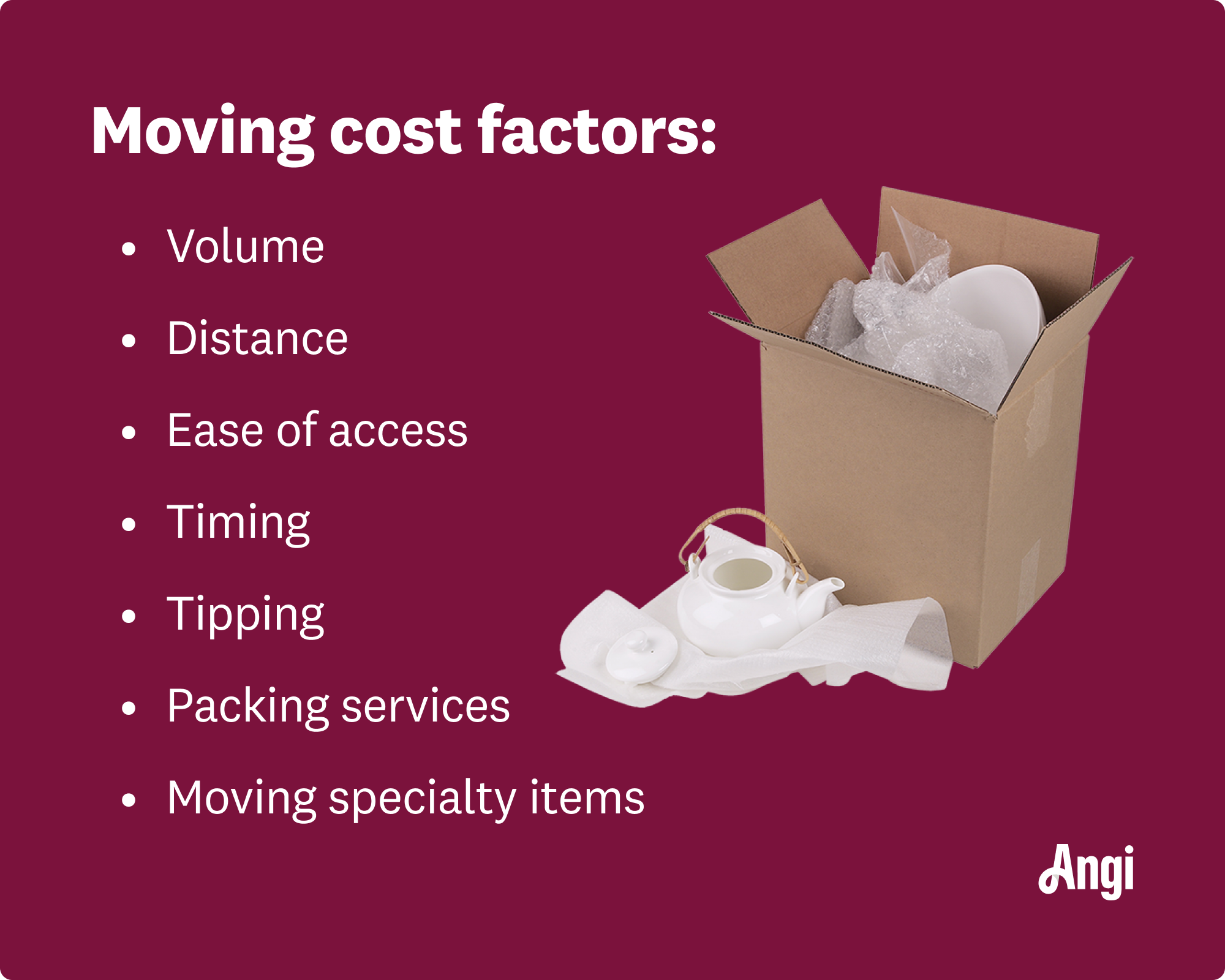Hiring movers can cost anywhere between $240 and $10,000. The national average is $1,400 for short-distance moves.
Moving is a thrill but there’s no denying that it can be a lot for one person to do on their own. Hiring a moving company is one easy way to simplify the process, and there are options available for just about every budget. We’ve compiled all the information you need to know to calculate your moving costs. Whether you’re moving far away or close to home, we’ll help you determine the right moving services for your needs.
How Much Does It Cost to Hire Movers Per Home Size?
The more you have to move, the more it will cost to hire movers. Local moves for a one-bedroom apartment can cost as little as $240, whereas moving a five-bedroom home to an entirely new state can be up to $10,000.
How Much Does It Cost to Hire Movers Near You?
Moving costs vary from state to state. In general, moving company prices will range from $25 to $50 per mover for each hour, though the distance traveled will also impact the final price. The average intrastate move (within the same state) is about $1,400, whereas the average interstate move (to a different state) will range from $700 to $10,000.
What Moving Services Can I Get on My Budget?
Moving companies in your area will be able to give you an accurate cost breakdown, but if you’re not sure if hiring movers is within your means, we’ve broken down what’s possible with a variety of budgets:
$500
This budget allows for a short-distance move within 100 miles for a 1-3 bedroom home without packing services.
$1,000–$1,500
Expect to pay this for a short-distance move for a 4-5 bedroom home without packing services. For long distance or interstate moves, this budget will cover the cost of relocating a 1 bedroom home without any additional services.
$1,500+
From here, your budget allows for a short-distance move for a 1-5 bedroom home with packing services and additional transportation of specialty items like cars and pianos. For long distance moves, you’ll need to pay between $2,000 to $7,000 to transport the contents of a 2 bedroom home, and anywhere from $4,000 to $10,000 for anything bigger.

How Much Does It Cost to Move Yourself?
Moving on your own can definitely be cheaper, but it’s important to consider the amount of labor that the project will require. Truck rentals range from $20 to $100 a day, though that can increase depending on where you’re dropping it off. If you’ll be handing in the keys to a different location, especially in a new state, the price could be significantly higher.
On top of that, you’ll also need to factor in the cost of gas, which can take up the bulk of your budget if you’re traveling long distances—not to mention extra fees you accrue along the way from hotel stays, tolls, and all those road trip snacks. Take the time to determine whether the reduced cost of doing it yourself is worth the effort it will require, or if you’ll be better off hiring professional movers.
Moving Costs Breakdown
The cost of moving can vary greatly depending on how much you’re transporting and how far you’re going. In general, it will range from $25 to $50 an hour per worker. Traveling over 100 miles can also cost extra, even if you’re moving in the same state. Here’s a quick breakdown of what you can expect based on the size of your home and the distance you’re traveling.
Intrastate vs. Interstate
Whether you’re starting a new adventure down the road in a new city or an entirely new state can also affect your moving prices. The average cost for an intrastate move is around $1,400 for every 7,400 pounds—though you may pay more if you’re traveling more than 100 miles. Interstate moves typically cost $5,600 for the same amount of weight and 1,200 miles of travel.
Cost Per Home Size
The size of your home can be a good base for determining your moving cost. Below are some costs based on home size and include two-three movers:
One bedroom: $240–$500
Two bedroom: $320–$700
Three bedroom: $480–$800
Four bedroom: $640–$1,200
Five bedroom: $800–$1,500
What Factors Influence Moving Costs?
Many factors determine the cost of moving, and some may even make your move cost more or less than you were expecting.

Volume
The more you’re moving, the higher the price will be. The average household’s items weigh about 7,400 pounds, and the average cost of moving is $1,400.
Distance
Taking the leap to move to a far-off city or a new state altogether is exciting, but can cost significantly more than local or intrastate moves. Moving companies’ prices for longer journeys including cross-country moves can cost anywhere from $5,700 to $10,000 thanks to the additional distance being traveled.
Ease of Access
If your apartment is situated on the top floor, all those extra flights of stairs might have an impact on the final cost of moving. Anything in your home that causes inconveniences to the movers, slows down the process, or requires more hands to help will increase the overall price.
Think about the obstructions in your home that get in the way of your day-to-day life—these will probably also get in the way of a moving company’s ability to do their job and cost more as a result. In some cases, it may be best to schedule an in-person consultation to find out exactly what you should expect to pay for your particular arrangement.
Timing
Costs of moving will go up or down depending on the time of year and the day of the week. In general, it’s more affordable to move during the fall or winter, on a weekday, or in the middle of the month. Moves that occur during the summer, on weekends or holidays, or at the beginning or end of the month, tend to be more expensive thanks to higher demand.
Tipping
Tipping at least 10% and up to 20% of your final bill is strongly encouraged, particularly if you’re working with local movers. If it’s in your budget and they do an exceptional job, consider upping that amount.
Packing Services
Most movers don’t automatically include packing services in their offers. These options can cost up to an additional $1,000 on average, but can also make the workload a lot easier on you if they’re within your budget. Hiring full-service movers will cost a minimum of $2,300 but these pros will tackle every step of the moving process from start to finish, including disassembling and reassembling furniture.
Moving Specialty Items
Moving heavy, delicate items like pianos or cars can also rack up additional fees. These can be anywhere from an extra $400 to $2,000, depending on the size and weight of an object. For example, moving a piano will cost about $400. Shipping a car will cost upwards of $1,000.
FAQs About Hiring Movers
What documents should a moving company have?
Movers have some of your most important items in their hands, so making sure the moving company you’ve chosen has these documents will make the process smoother for both sides.
U.S. Department of Transportation Registration Number: Find out if a company you’re interested in is registered at protectyourmove.gov. You can also use the site to search for complaints from previous clients.
A Written Order of Service or Tarif: This is an itemized list that will detail the probable costs of your move. Know what you need to pay up front so you’ll be better prepared on moving day.
Bill of Lading: This is the contract between you and the moving company. Before signing, make sure the details in it are the same as what’s written in the order of service. Take time to carefully double check that everything stated is what was originally agreed upon.
Liability Insurance and Valuation Coverage: Your movers will be liable for any damage that occurs to your belongings during the move. Obtain these documents to determine exactly what will and won’t be covered. Released value protection is offered at no additional charge but covers only $0.60 per pound of each object. Full coverage protection is more comprehensive but comes at an additional cost.
Freight Bill: This is an itemized breakdown of services performed that you should receive after the move is complete.
Should I work with a broker?
Moving brokers are third-party sales teams that connect clients with moving companies. They aren’t liable for the transportation of your belongings and can’t always secure a mover by your deadline. When in doubt, work directly with a moving company in your area to ensure you have what you need when you need it.
How do I find a moving company in my area?
Start by using a moving cost calculator to determine what’s doable in your budget. From there, you can start requesting quotes from a wide selection of movers to determine which option is best for you. Once you’ve narrowed down your choices, see if they can provide you with references and a consultation before hiring.





